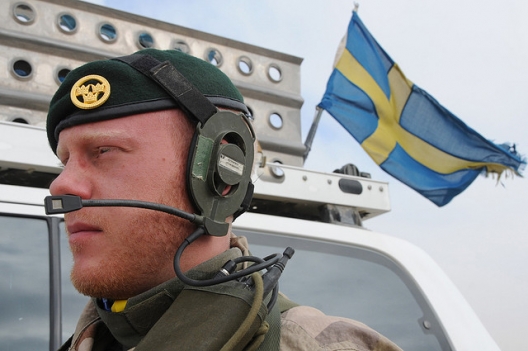 It’s a good time to have friends in Eastern Europe.
It’s a good time to have friends in Eastern Europe.
Leaders in the region, who have reacted to Russia’s occupation of Crimea by expressing fears that they could be next, are now taking solace in their alliances. “Thanks be to God, we are NATO members,” exclaimed Lithuanian President Dalia Grybauskaite last week. This month, Norway is hosting 16,000 NATO soldiers for previously planned cold-weather training exercises on the Russian border, much to the Russians’ displeasure. Among those participating in Operation Cold Response are 1,400 Swedish troops under the Nordic nation’s limited partnership with the alliance.
Non-aligned since the early 19th century, Sweden’s “splendid isolation” has endured two world wars and even the five-decade superpower slugfest that dominated the late 20th century. That could change, however, in the wake of Russia’s intervention in Ukraine. Last week, Swedish Finance Minister Anders Borg indicated that the defense budget, to which he had recently announced cuts, would be increased as a result of the crisis. Deputy Prime Minister Jan Björklund also publicly floated the idea of Swedish membership in NATO, warning that Russia could attempt to seize Gotland, a strategically located Swedish island province in the Baltic Sea, if it chose to attack the Baltic states of Estonia, Latvia, and Lithuania. Sverker Göransson, the supreme commander of Sweden’s military, has rejected Björklund’s call for a change to the country’s defense doctrine. . . .
The idea of joining NATO has also gained traction among Swedes in recent years. A 2013 poll found that popular support for becoming a member had jumped 9 percent in two years, even though it still falls short of a plurality. “Sweden must realize that we can no longer defend ourselves alone. NATO membership must be debated seriously. It is the best long-term option for our defense and security,” said Christian Democratic spokesman Mikael Oscarsson last January after the coalition government to which his party belongs announced a formal review of Swedish military capabilities. “With significantly higher spending on defense and material acquisitions, we will see better equipped and trained Russian troops in this region. This strengthening requires a credible response by Sweden,” Oscarsson added. . . .
Last year, after Göransson’s claim that the military could only defend the country for a week, Swedish Prime Minister Fredrik Reinfeldt stated that, despite their build-up, Russian armed forces have “neither the will nor the capacity to attack Swedish territory.”
But Crimea’s example might force some in the Swedish government to reassess the threat’s likeliness. “You have to build up your fire brigade to the same dimension as the risk of a fire,” Björklund told reporters last week. “How many people thought that Russia would go into Crimea? The same argument could hold true for the Baltic states.”
Image: Swedish soldier in Afghanistan (photo: ISAF)
